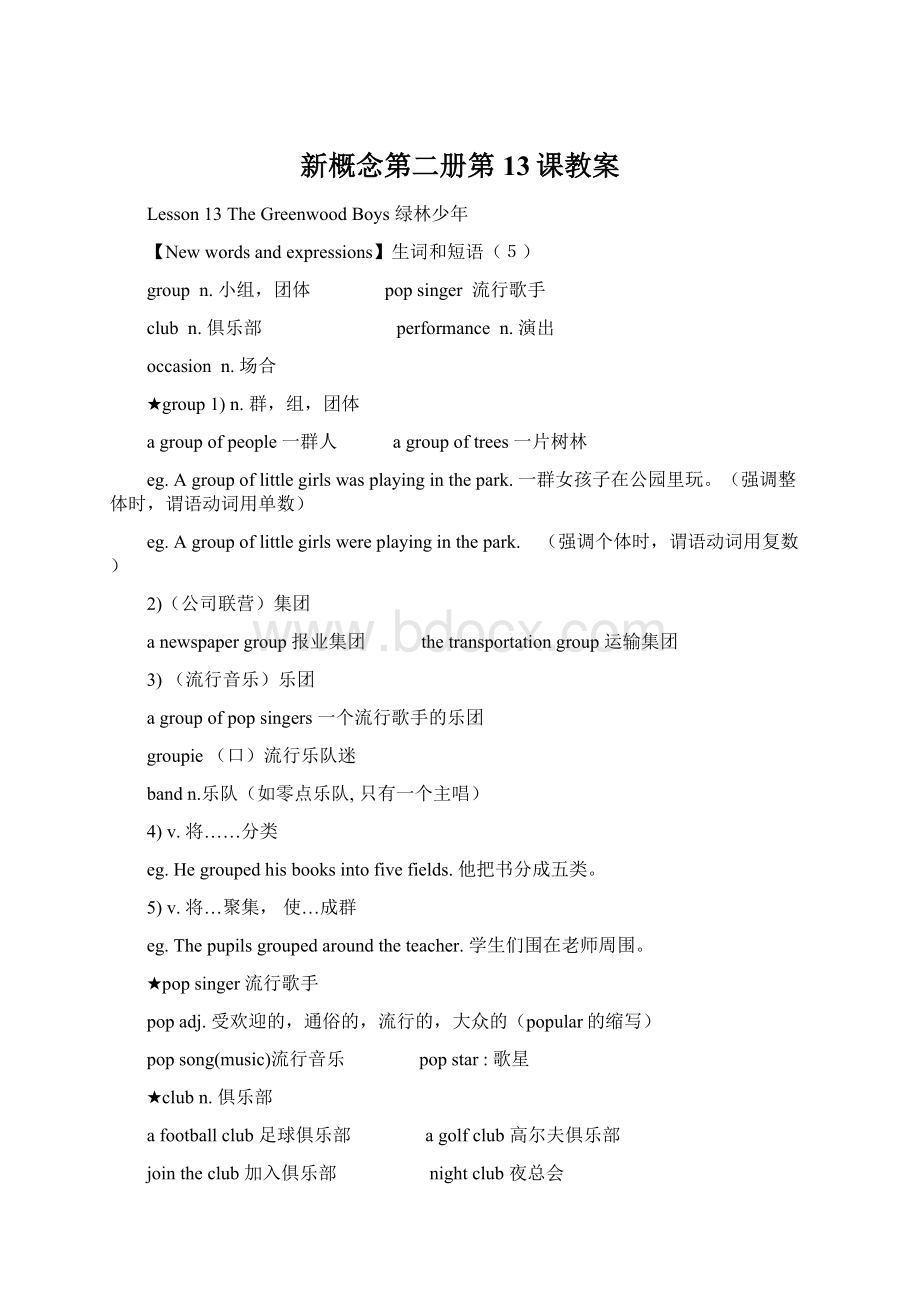新概念第二册第13课教案.docx
《新概念第二册第13课教案.docx》由会员分享,可在线阅读,更多相关《新概念第二册第13课教案.docx(10页珍藏版)》请在冰豆网上搜索。

新概念第二册第13课教案
Lesson13TheGreenwoodBoys绿林少年
【Newwordsandexpressions】生词和短语(5)
groupn.小组,团体 popsinger流行歌手
clubn.俱乐部 performancen.演出
occasionn.场合
★group1)n.群,组,团体
agroupofpeople一群人 agroupoftrees一片树林
eg.Agroupoflittlegirlswasplayinginthepark.一群女孩子在公园里玩。
(强调整体时,谓语动词用单数)
eg.Agroupoflittlegirlswereplayinginthepark. (强调个体时,谓语动词用复数)
2)(公司联营)集团
anewspapergroup报业集团 thetransportationgroup运输集团
3)(流行音乐)乐团
agroupofpopsingers一个流行歌手的乐团
groupie(口)流行乐队迷
bandn.乐队(如零点乐队,只有一个主唱)
4)v.将……分类
eg.Hegroupedhisbooksintofivefields.他把书分成五类。
5)v.将…聚集,使…成群
eg.Thepupilsgroupedaroundtheteacher.学生们围在老师周围。
★popsinger流行歌手
popadj.受欢迎的,通俗的,流行的,大众的(popular的缩写)
popsong(music)流行音乐 popstar:
歌星
★clubn.俱乐部
afootballclub足球俱乐部 agolfclub高尔夫俱乐部
jointheclub加入俱乐部 nightclub夜总会
n.梅花(纸牌)
thetenofclubs梅花牌的10点
spade黑桃,铁锹 heart红桃,心 diamond方块,钻石
★performancen.演出
①n.执行,完成,履行
Heispraisedfortheexcellentperformanceofhisduties.
②n.表现,工作情况
Hisperformanceinthemathematicsexamisnotverygood.
③n.演出,表演 Thepopsingerswillgivefiveperformances.
-mance名词后缀
performv.演出
★occasionn. 1)场合,时刻
中文:
在某种场合,某种条件下,某种环境中
英文:
occasion=time某个时候
onthe(this.that)occasion在这(那)种场合下
2)n.机会,时间suitableorrighttime
occasionforsth做某事的时机或场合
eg.I'llbuyacariftheoccasioncomes.有机会我会买辆车。
occasionally=sometimes有时候,偶尔
【Text】
TheGreenwoodBoysareagroupofpopsingers.Atpresent,theyarevisitingallpartsofthecountry.Theywillbearrivingheretomorrow.Theywillbecomingbytrainandmostoftheyoungpeopleinthetownwillbemeetingthematthestation.TomorroweveningtheywillbesingingattheWorkers'Club.TheGreenwoodBoyswillbestayingforfivedays.Duringthistime,theywillgivefiveperformances.Asusual,thepolicewillhaveadifficulttime.Theywillbetryingtokeeporder.Itisalwaysthesameontheseoccasions.
参考译文
“绿林少年”是一个流行歌曲演唱团.目前他们正在全国各地巡回演出,明天就要到达此地.他们将乘火车来,镇上的大部分青年人将到车站迎接他们.明晚他们将在工人俱乐部演出.“绿林少年”准备在此逗留5天.在此期间,他们将演出5场.同往常一样,警察的日子将不好过,他们将设法维持秩序.每逢这种场合,情况都是这样.
【课文讲解】
1、Atpresent,theyarevisitingallpartsofthecountry.
★atpresent=now=atthistime目前,现在
Thedoctorisverybusyatpresent.
nowadaysadv.目前 uptonow=sofar到现在为止
★present 1)n.['prezənt]当前,目前
thepast,thepresentandthefuture过去,现在和将来
eg.Ican'thelpyouatpresent------I'mtoobusy.
2)adj.现存的,现有的 existingorhappeningnow
thepresentdifficulties现有的困难 thepresentproblems现存的问题
3)adj.在场的,出席的
eg.Whoelsewaspresentonthatoccasion?
当时还有谁在场?
4)n.礼物 gift是稍正式的说法
5)v.[pri'zent]赠送,呈现,呈递,授予
eg.Themayorpresentedtheprizesinperson.市长亲自颁发这些奖项。
eg.Theprincipalpresentedadiploma[di'pləumə]toeachofthegraduates. 校长为每位毕业生颁发文凭。
6)v.表示,显露(表情等)
presentacalmface神色安详
7)v.介绍,引见(向地位较高的人说)
eg.MayIpresentMr.Browntoyou?
★visitv.拜访、参观;(歌手)巡演
visit+地点表示去某地
TheheadmastersoftheNewOrientalschoolvisitedLanzhou.这指演讲
★allpartsofthecountry全国各地(all在这里是“各种的,各个”)
allpartsoftheworld全世界各地;介词用in
inallpartsoftheworld在全世界各地
alloverthecountry遍布全国 allovertheworld遍及全世界
★part
1)n.部分 spareparts配件
eg.Theearlypartofherlifewasspentinaremotevillage.
eg.WhichpartsofFrancehaveyouvisited?
你去过法国哪些地方?
2)角色part,role,character
performthepartoftheHamlet扮演哈姆雷特这一角色
or:
playthepartoftheHamlet
or:
actthepartoftheHamlet
or:
takethepartoftheHamlet
或将上述表达中的part换成role,character。
3)v.分开
partasfriends友好地分手
Theypartedatthestation.他们在车站分手了。
2、Theywillbecomingbytrainandmostoftheyoungpeopleinthetownwillbemeetingthematthestation.
★willbedoing将来进行时态,用来表示最近的将来正在进行的动作或说话人设想已经安排好的事情,将来进行时态的意思往往等于一般将来时态.
Wewillbeacting.我们将要行动了
mostoftheyoungpeopleinthetown镇上的大部分年轻人(介词短语作定语)
mostof+the…大多数的……(一定要加‘the’)
mostofthebooks;mostofthetime
mostoftheyoungpeople=mostyoungpeople
moststudents=mostofthestudents.
★meet
①vt.&vi.(偶然)遇见,遇到
Wemetatarestaurant.
②vt.(约定地点或时间)和……会面,迎接
meetsb.+地点 去某地接某人
WhowillbemeetyouwhenyouarriveinLondon?
seesb.off送行,目送
③vt.(经介绍)和……相识/见面
I’dliketomeetyourbrother.
3、TomorroweveningtheywillbesingingattheWorkers'Club.
★lastnight昨天夜间;tonight今天夜间;tomorrownight明天夜间;nextnight第二天晚上
tomorrowevening明天晚上;yesterdayevening昨天晚上;thisevening今天晚上
★attheWorkers'Club在工人俱乐部
4、TheGreenwoodBoyswillbestayingforfivedays.Duringthistime,theywillgivefiveperformances.
…willbestayinghereforfivedays逗留五天
…givefiveperformances演出五场
5、Asusual,thepolicewillhaveadifficulttime.
★asusual象往常一样,照例
Onthatday,hewaslateforworkasusual.
★difficult这里解释为“难对付的”、“费劲的”,指麻烦比较多。
haveagoodtime玩得开心
haveahardtime生活得艰辛
haveadifficulttime日子不象平时那样惬意
6、Theywillbetryingtokeeporder.Itisalwaysthesameontheseoccasions.
★trytodosth.设法做某事,尽力做某事
★order常用的意义是“次序、顺序”,也可当“治安、秩序”讲
keeporder维持次序 publicorder治安
★当用occasion表示在某个/些场合时,它与介词on连用
ontheseoccasion(s)每逢这种场合
★thesame表示情况相同
注意同一意思的多种表达方式
Whyareyoulate?
=Whattookyousolong?
你为什么迟到?
【Keystructures】
将来进行时
将来进行时由will/shall+be+现在分词构成,通常用于表示最近或很久的将来正在进行的动作。
将来进行时常用来表示说话人设想已经安排好的事。
I’llbeworkingformyexamsnextmonth.下个月我将用功看书准备考试。
Bythistimetomorrow,I’llbelyingonthebeach.
将来进行时与一般将来时有时表达的意思差不多,但一般将来时中的will经常具有蓄意为之的含义(如表示主语的意愿、决心、许诺等),将来进行时不具有这些含义,只表示单纯的将来,或者说只陈述将来的事实,但它语气比单用will时委婉客气。
Whenwillyoufinishtheseletters?
(如上司对下属)
WhenwillyoubeseeingMr.White?
(如下属对上司)
Marywon’tpaythisbill.(她拒绝付帐)
Marywon’tbepayingthisbill.(将来的事实)
Won’tyoujoinusfordinner?
你来和我们一起吃饭好吗?
(邀请)
Won’tyoubejoiningusfordinner?
你会和我们一起吃饭吗?
(将来的事实)
【语法精粹】
1."Themeetingisscheduledtobeginat7o'clock"
"But__C___adelay."
A.itwillbeB.there'dbeC.therewillbeD.thereis
schedule按计划; delayn.延迟,拖延和耽误
itbe它是,be动词的后面一旦加名词,往往认为主语和名词之间是等号关系
therebe哪儿有(某地有某物),有某事发生
Therewillbeameeting.那儿将开会
Therewasafire.发生大火
2.He'llleaveforParisbeforeyou___C__nextweek.
A.willcomebackB.willbebackC.comebackD.cameback
before在这里是状语从句的标志
在状语从句中不可能出现将来时,都被一般现在时态取代
3.Ournextmeeting__C___on1stDecember
A.hasbeenheldB.willholdC.istobeheldD.isholding
beto,将来的标志,是将来还是被动
4.Where__C___awill,thereisaway.
A.therewillhaveB.hasbeenthereC.thereisD.therehasbeen.
是个谚语“有志者事竞成”,“哪儿有愿望,哪儿就有路”
where引导的是地点主语从句
5.It__B___beWednesdaytomorrow.
A.isgoingtoB.willC.isabouttoD.isto
Will和begoingto一般的情况可以互换,遇上没有办法打算和计划安排的,只能用willbe(单纯的表将来)
beaboutto计划打算;beto计划打算;begoingto计划打算
【SpecialDifficulties】
名词所有格:
一般只对人和某些生物用-’s,名词所有格放在其所修饰的名词之前,但在上下文很清楚时名词可省略。
名词所有格的规则
①在单数名词及不以-s结尾的人名后加-'s;
②在以-s结尾的单数名词后加 -'s;
③在规则的复数名词的-s后面加所有格符号';
④在以-s结尾的人名后面即可以用's也可以用所有格符号';
⑤如果是用and连接的两个人名,则在第二个人名上加-'s;
也可以同时有两个所有格:
Mybrother’sneighbour’ssisterisanurse.我兄弟的邻居的姐姐/妹妹是一名护士。
⑥有些无生命的物体后面也可以用所有格,如与时间有关的:
intwentyminutes'time
3minutes'walk(drive)走路或开车三分钟的路程
amonth’ssalary
表示值多少钱也可以用所有格:
Iwanttenpounds'worthofmincedmeat.(mincedmeat碎肉)
Howmuchdamagewasthere?
哪儿有多大的损失?
Therewasahundredpounds'worthofdamage.
【语法精粹】
Iwant(C).
A.adollarworthcandyB.candyadollar'sworth
C.adollar'sworthofcandyD.adollarworth'scandy
【Multiplechoicequestions】
5Duringthistime,theywillgivefiveperformances.That'swhatthey'lldo___a___thistime.
a.inb.onc.ofd.while
duringthistime:
在这段期间
during和in之间有区别,但是它们之间却是近义词
duringthistime=inthistime(thistime这一次)
6Thepolicewillhaveadifficulttime___a___.
a.asusuallb.asusualc.thanusuad.fromusual
asusual像往常一样
7Thepolice___b___expectingthesingerstoarrivesoon.
a.isb.arec.willd.was
thepeople,thepolice,thecattle集合名词,表示复数
8Theyarepopsingers.So___c___.
a.theyarefolksingersb.theyarepublicsingers
c.everyonelikesthemd.noonelikesthem
pop=popularadj.受欢迎的,everyonelikes
folkadj.民间的,民族;publicadj.公众的
12It'salwaysthesameontheseoccasions.It'salwaysthesameat___d___likethis.
a.situationb.conditionsc.placed.times
ontheseoccasions:
在一个时候
situation:
情况,inthesituation
condition:
状态,条件,inthecondition
11TheGreenwoodBoyswillgivefiveperformances.Theywillgivefive___a___.
a.recitalb.executionsc.playd.songs
recitaln.朗诵,(对外公开)的演出
executionn.演出(倾向技巧);playn.戏剧;songs n.歌子
补充:
★usuallyadv.通常地,一贯地
oftenadv.常常;经常;时常;在大多数情况下
alwaysadv.总是;永远;一直;无例外地;重复地;有规律地
eg.WhatdoyouusuallydoonSundays?
周日你通常做什么?
Iusuallysleep.我通常睡觉。
IusuallygotoNCEclass.我通常去上新概念英语课。
neveradv.从不,永不,从来没有
eg.Johnneverwasheshisneck.约翰从不洗他的脖子。
hardlyadv.几乎没有,几乎不;刚刚,仅仅
eg.I'vehardlymethim.我很少见到他。
rarelyadv.不常,很少地,难得地
seldomadv.很少,罕见,难得
eg.Irarelyhavedinnerswithmyfamily.我难得同家人一起吃饭。
or:
Iseldomhavedinnerswithmyfamily.
occasionally[ə'keıʒənəlı]adv.有时候,偶而
eg.Weareoccasionallyintrouble.我们偶尔会有麻烦。
sometimesadv.有时,间或
eg.Isometimesgetveryangrywithhim.我有时对他很生气。
oftenadv.常常;经常;时常;在大多数情况下
eg.Heoftengetsdrunk.他经常喝醉。
六、看图写话usuallyadv.通常
eg.Iusuallyhavemylunchatschool.我通常在学校吃午饭。
almostadv.几乎,差不多,差一点;将近
和风细雨万紫千红鸟语花香山清水秀蒙蒙细雨古往今来eg.Thedoorisalmostopen.这扇门几乎都是开的。
alwaysadv.总是;永远;一直;无例外地;重复地;有规律地(频率最高)
禾字旁:
秀、香、和、秋eg.Heisalwaystalkingabouthisgirlfriendasifhehadnothingelsetotalkabout. 他总是谈论他的女朋友,好像没有别的事可谈一样。
走之底:
这、边、远、进、过、道、选、连、送★police警察
集合名词,类似的还有:
people,cattle
eg.Thepolicearesearchingforthethief.警察正在搜捕那个盗贼。
宝盖头:
完、家、定eg.Thepolicemanwasinjured.那个警察受伤了。
绞丝旁